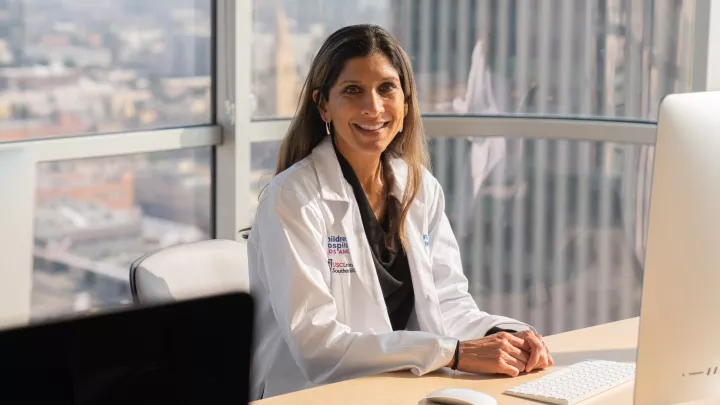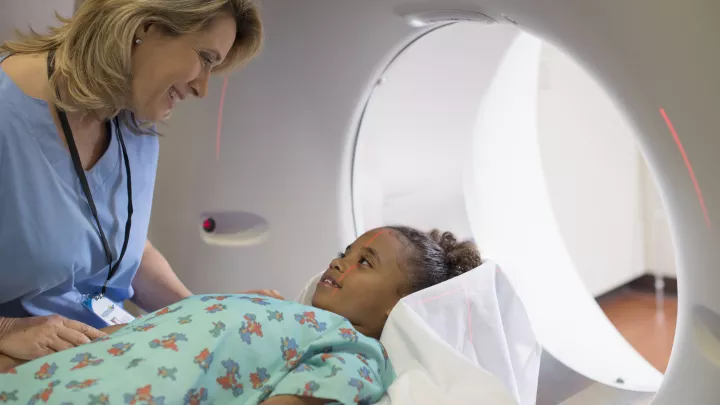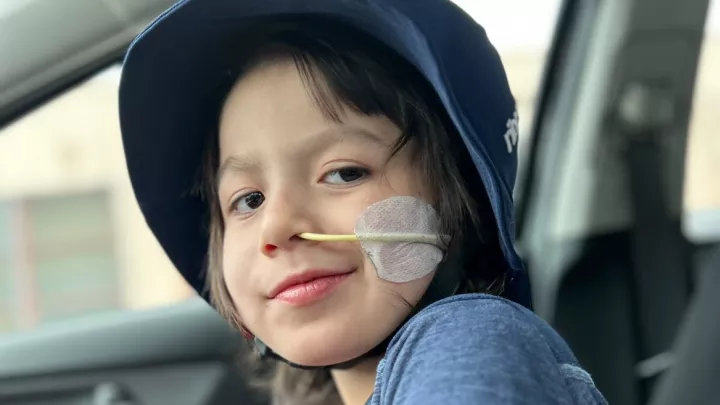Movement Disorders Clinic
Children with movement disorders often have trouble controlling their movements. Our expert pediatric neurologists have advanced training in movement disorders. They work alongside orthopedists, neurosurgeons, physical and occupational therapists, and specialized nurse practitioners to optimize your child’s care. Our targeted approach maximizes your child’s quality of life.
Children’s Hospital Los Angeles is one of the few programs in the nation to offer specialty-trained staff and such a wide range of movement disorder treatments. Our pediatric Movement Disorders Clinic includes several subspecialty treatment clinics.
Movement Disorders Clinic: Why Choose Us
At Children’s Hospital, your child benefits from:
- World-class diagnostic tools: Our specialists regularly treat many conditions that other doctors see only once or twice in a lifetime. Thanks to our in-house genetic testing lab, our neurology team can diagnose even the rarest genetic disorders. Our robust experience combined with our on-site genetics lab allow us to provide world-class care options not available elsewhere in the region.
- Collaborative care: In the Movement Disorders Clinic, our neurologists work closely with specialists in orthopedics, neurosurgery, physical therapy and occupational therapy to optimize your child’s progress. Together, these specialists create a comprehensive care plan for your child. These in-depth, multidisciplinary evaluations can optimize your child’s chances for a better quality of life and improved motor function.
- Family-centered care: Our movement disorder specialists look at all the factors that impact your child’s functioning. We assess gross motor skills such as walking or balancing, and fine motor skills like holding a pencil or buttoning a coat. These in-depth assessments help us provide more targeted treatments that meet the needs of your child and family.
- A variety of treatment options: The specialists at CHLA offer a range of treatments spanning from oral medications to surgical procedures that target your child’s individual needs and care goals.
What Are Movement Disorders?
Every movement your child makes, even automatic ones, like smiling or blinking, involves complex signals between the brain, nerves and muscles. If children have brain or spinal cord damage, their brains may have trouble sending the right signals to the muscles and nerves.
Problems with these signals result in problems with movement. This may occur due to an injury, or it may be congenital (present at birth).
Movement disorder symptoms
Children with movement disorders may have one or more of these problems:
- Muscle pain
- Muscle spasms or tightness
- Loss of coordination
- Loss of motor control
- Balance difficulties
- Muscle weakness or paralysis
- Uncontrolled movements (such as tremors)
- Speech problems
What to Expect During Your Movement Disorders Clinic Appointment
When you come to the pediatric Movement Disorders Clinic, you and your child meet with our movement disorder doctor or nurse practitioner. These specialists discuss your child’s medical history and symptoms, then do a physical examination. Children may need to walk around the room, repeat specific phrases or write for this assessment.
We offer an initial diagnosis and treatment options at this visit. If you decide to start your child on medication, a nurse will provide educational materials about the medicine. Depending on the treatment plan, your child may return for follow-up care at one of our specialized clinics.
Movement Disorder Subspecialty Clinics and Services
Within the Movement Disorders Clinic, we offer specialized treatment programs. These include:
Baclofen Pump Clinic
Baclofen is a type of medication that helps relax the muscles. Children who have severe spasticity may be candidates for an implantable (intrathecal) baclofen pump.
Pumps are often more effective than oral medication, because they deliver the medicine directly to the spine. Families work closely with the physician and nurse practitioner in this clinic to ensure that the treatment works well. Find out more about our Baclofen Pump Clinic.
Botulinum Toxin Clinic
Botulinum toxin is a medication for treating spasticity and dystonia. We are one of the only places in Southern California where children can get botulinum toxin injections for dystonia. These injections work by temporarily decreasing muscle tightness. Children receive periodic injections at the Botulinum Toxin Clinic, usually every three months.
Treatments for Cerebral Palsy
Cerebral palsy is caused by injury to the developing brain during infancy, or even before birth. This condition leads to problems with muscle tone, posture, strength and movement.
Children with cerebral palsy have difficulty controlling their movements, and may benefit from treatment of spasticity or dystonia. Care options include medications, intrathecal baclofen pumps, botulinum toxin injections, or surgical procedures.
Our multidisciplinary approach to cerebral palsy care includes collaboration with specialists from:
- Jackie and Gene Autry Orthopedic Center
- Developmental-Behavioral Pediatrics
- Neurosurgery Program
- Occupational Therapy
- Physical Therapy
- Rehabilitation Services
Conditions We Treat
Movement disorder specialists at Children’s Hospital diagnose and treat all types of movement disorders in children, including:
- Ataxia
- Bradykinesia
- Cerebral palsy
- Chorea
- Dyspraxia
- Dystonia
- Myoclonus
- Parkinsonism
- Tic disorders
- Tremor
- Spasticity


